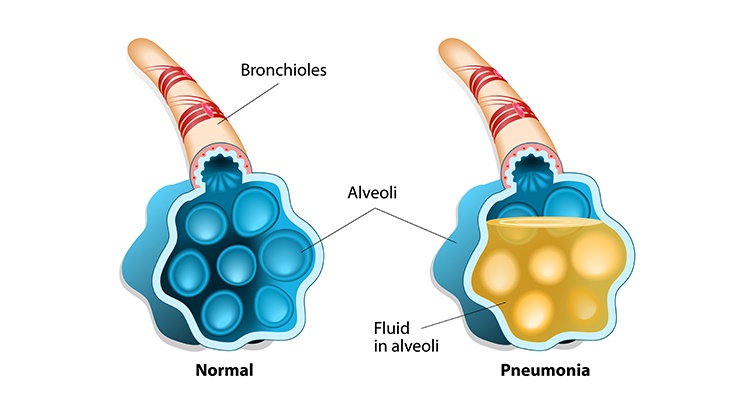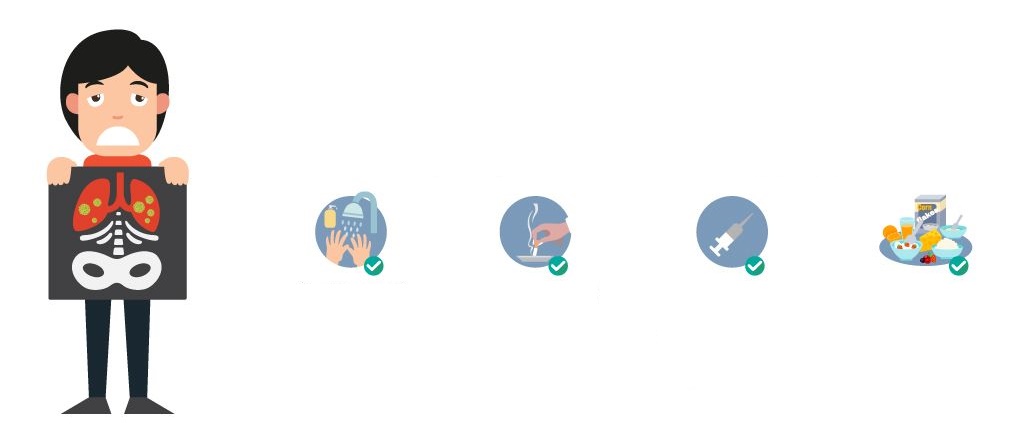- Swastik Clinic, Ahmedabad, GJ, IND
- Call: 8849867169 (For Appointment)
- Mon - Sat: 10 AM - 08 PM
- Sun: Only Emergencies
Why Pneumonia Can Be Dangerous for the Elderly?

Why Pneumonia Can Be Dangerous for the Elderly?
Pneumonia is a treatable disease that got a bad reputation for turning serious without proper medical attention and care.
Pneumonia is an infection of the lungs caused by a variety of pathogens, including viruses, bacteria, and fungi. This infection affects the air sacs in either one or both of your lungs. The tiny air sacs in your lungs become inflamed and can fill with fluid or even pus.
Pneumonia can range from a mild to serious or life-threatening infection. It is most dangerous for people older than age 65 because elderly people tend to have health issues or weakened immune systems. Additionally, pneumonia is the leading cause of death worldwide for children under 5 years of age.
WHO’S AT RISK?
Pneumonia can affect anyone. But there are certain factors for increased risk of pneumonia such as weaker immune system, condition or lifestyle that affects the lungs.
People that are at an increased risk for having a serious or life-threatening case of pneumonia include:
- Children younger than 2 years old
- Adults aged 65 or above – highly at risk
- Hospitalized people, particularly if they have been placed on ventilator
- Individuals with chronic disease such as asthma, COPD, diabetes or restrictive lung disease
- Individuals with weakened immune system
- Smokers
SOME SYMPTOMS OF PNEUMONIA
If you or someone you know has the following symptoms, you should make an appointment with pulmonologist without any delay. Recognizing symptoms include:
- Shortness of breath
- Cough with mucus or phlegm
- Chest pain while coughing or breathing
- Tiredness or fatigue
- Confusion, particularly in elders
- Nausea, vomiting
- Diarrhoea
- Abnormal body temperature
It is important to carefully monitor people who belong to at-risk groups for pneumonia due to a weakened immune system, age, or a chronic or acute condition.
TYPES OF PNEUMONIA THAT CARRY A HIGHER RISK

Viral Pneumonia
Viral pneumonia is typically a milder disease and symptoms occur gradually.
Bacterial
These pneumonias are often more severe. Symptoms can either develop gradually or come on suddenly and could affect one or many lobes of the lung.
Fungal
Fungal pneumonia is typically more common in people with a weakened immune system and these infections can be very serious.
DIAGNOSIS & TREATMENTS FOR PNEUMONIA
A pulmonologist or pneumonia specialist doctor will determine if you’re being affected by pneumonia with certain physical examinations and evaluation of your medical history.
These tests that will be performed may include:
- Blood test
- Chest X-ray
- Pulse oximetry
- Sputum test
- CT scan
- Pleural fluid culture
TREATMENTS:
Seniors diagnosed with pneumonia must be careful to take all their medications as prescribed by the doctor. People who have existing health conditions are particularly vulnerable to the effects of pneumonia and should take extra precautions to prevent their condition from worsening.
Allowing the body plenty of rest and hydration is one such way to speed up the recovery process.
PREVENTING PNEUMONIA

You can help to prevent serious or life-threatening pneumonia infection by doing the following:
Monitor your health with recognizing symptoms
Be alert with all the symptoms, especially if you have any risk factors. Also, remember that pneumonia can also follow other respiratory infections. So take notice if you already have been sick.
Getting vaccinated
Many vaccines can help prevent infections that can potentially cause pneumonia. Talk to your pulmonologist for more detail about vaccination for pneumonia.
Practice good hygiene
Wash your hands frequently after using bathroom, before eating and even before touching hands, face and mouth.
Follow healthy lifestyle choices
Avoid smoking and be sure to keep your immune system boosted through regular exercise and a healthy diet.
TAKEAWAY…
Pneumonia is a lung infection that can sometimes lead to severe or life-threatening illness and even death. If you or a loved one is experiencing symptoms of pneumonia, it’s important to go see a pulmonologist as soon as possible.
With Pneumonia, early diagnosis is key and leads to better outcomes.
Recent Posts
Archives
- April 2022
- January 2022
- December 2021
- November 2021
- August 2021
- July 2021
- June 2021
- May 2021
- April 2021
- March 2021
- February 2021
- January 2021
- December 2020
- November 2020
- October 2020
- September 2020
- August 2020
- July 2020
- June 2020
- May 2020
- April 2020
- March 2020
- February 2020
- January 2020
- December 2019
- November 2019
- October 2019
- September 2019
- August 2019
- July 2019
Categories
Recent Posts


I Got Covid-19 & Have Asthma – What Now?
09th Jan 2022
